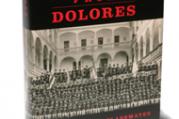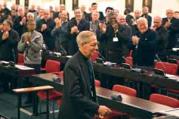Click here if you don’t see subscription options








Patrick Symmes, the author of The Boys from Dolores, is a talented wordsmith. The reader can almost smell the dust that springs up from the streets of Santiago as he describes small boys wending their way to the Jesuits Colegio de Dolores in the early 1940s. One also senses the dust of memories being wiped away by the gnarled hands of former students as they stare at a copy of a 1941 photo of 238 students, including Fidel Castro and his brothers Ramn and Ral. The memories that the photo evokes is the touchstone of this bookthe talisman of a time and place before the students were sent on journeyssome into power, others into exile and regret.
The Boys of Dolores recounts the stories of some of the students included in that photo as they took power in Cuba or went into exile, as many did. A private school for boys run by Spanish Jesuits, Dolores emphasized developing rigorous analytical skills and intellectual and personal discipline, in the context of a curriculum that emphasized both the classics and new scientific developments. The school attracted boys from middle and upper class families who wanted their sons to have the best education available. Fidel Castro was reportedly an apt student and, as he remarked in an interview with the Brazilian theologian Frei Betto many years later, he thought the school was truly superior. According to Symmes, the Jesuits emphasized the need to choose between two standardsgood or evil, Christ or Satan. Such a stark binary approach does not sound very Jesuitical, and one wonders to what degree later events may have influenced the memories of Symmes informants.
In short, The Boys from Dolores is a story of the vagaries of memory, the deeply rooted internal conflicts that have shaped Cuba both past and present, and the experience of exile, both geographical and pyschological.
As Symmes plumbs the memories of the former students he concludes that Memory was writing Cuban history now, the curious retrospective prediction ordered all understanding, even as the events occurredperhaps even before they occurred. The human need for agency, for patterns, gave purpose and shape to the chain of events. People needed a guide, augury in a voice that crystallized the new truths, explaining that things had gone bad, permanently wrong, at just one particular moment. And that moment was usually the one in which each recollecter had made the decision. It was the decision to leave that brought with it the knowledge that all was finished, every hope over. Hindsight is twenty Cubans talking about the Revolution.
While Symmes is frequently insightful, the complexities of Cuba and Cubans sometimes disappear in clever turns of phrase. When retelling and analyzing memories he focuses on moments and mementos rather than on processes. As the above quote indicates, he does not always capture the agonizing process of deciding to go into exile so sensitively described by Edmundo Desnoes in the novel Memories of Underdevelopment. He also tends to reduce long-standing internal conflicts in Cuba to binary oppositeswhites versus blacks, rich versus poor, Catholicism versus Santera. None accurately reflect the incredibly complex nature of Cuban history or of cubanidad.
Symmes does, however, capture very well the sense of being unmoored that exile brings, as well as the temporal confusion. In focusing primarily on the stories of a half dozen exiles, he maps out the process, as he phrases it, of the exiles filling their empty pockets with new things. That is, they built lives, while retaining a deep nostalgia for the old. Symmes subjects struggle to explain to himand to themselveswhat happened to them and to Cuba. For some it was the malevolence of Fidel, but for others the profound socioeconomic inequalities and corruption and abuse in the Cuban government that precipitated the revolution, which they wished had evolved differently. For those students who remained in Cuba there is also a sense of loss of the future they had imagined while at Dolores. Particularly touching is the description of an elderly graduate still living in Santiago who helps other former students in need by collecting food and clothing.
What does this book say about the formation of Fidel Castro as a youth? Symmes suggests that while he exhibited some leadership capacities, he did not appear to be entirely at home at Dolores. While Castros family was wealthy, the author implies that their inferior social status made Fidel sensitive to class differences and inclined to champion the underdog. At the same time, his ego led him to sometimes act like a bully. The vignettes are too few to draw any substantive conclusions and, of course, Symmes sources are predominantly those who view todays Cuba from exile. In that he reaffirms his sense that memory continues to write Cuban history in substantial ways.
Nelson, what do you think?
Best,


